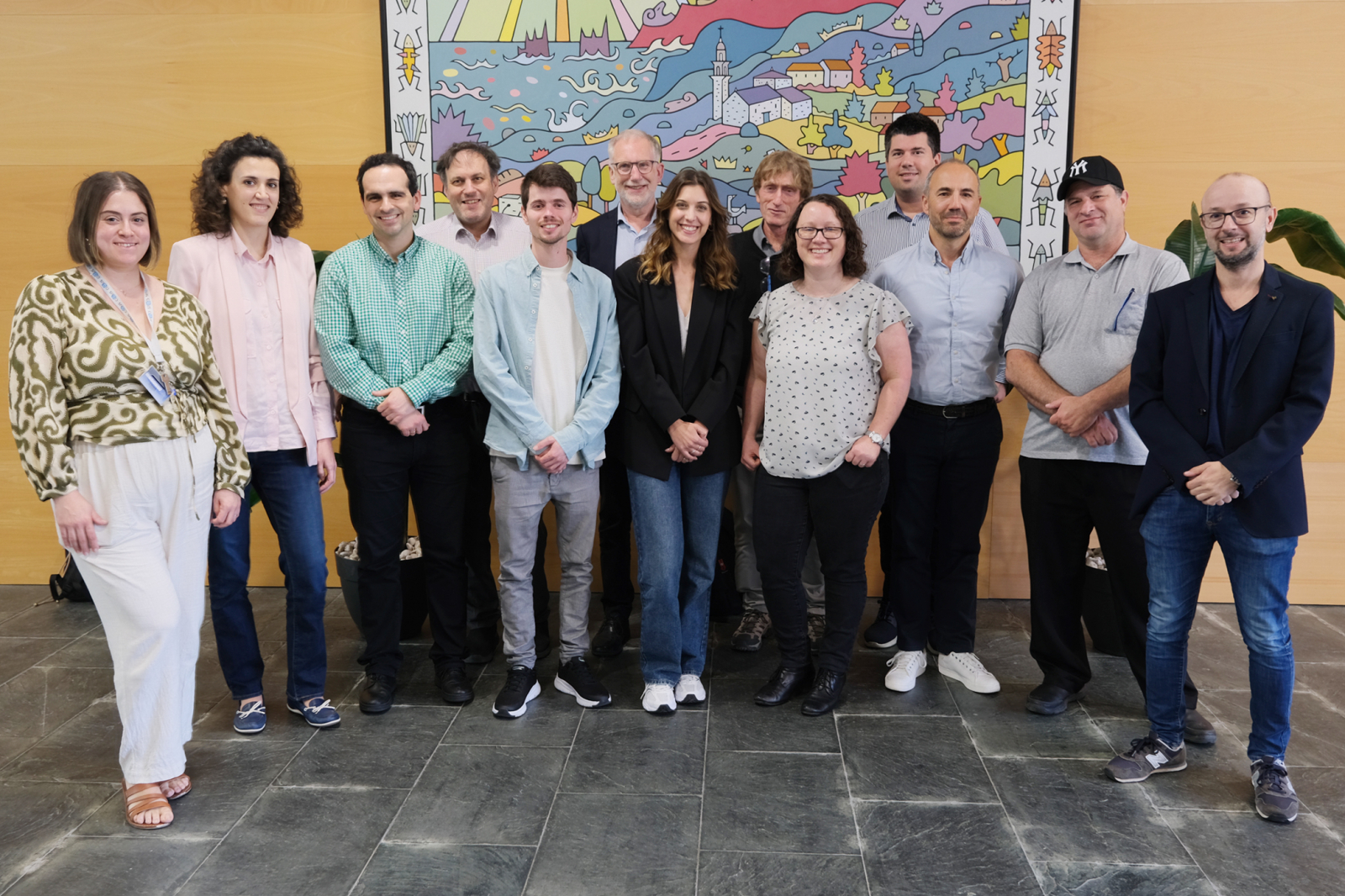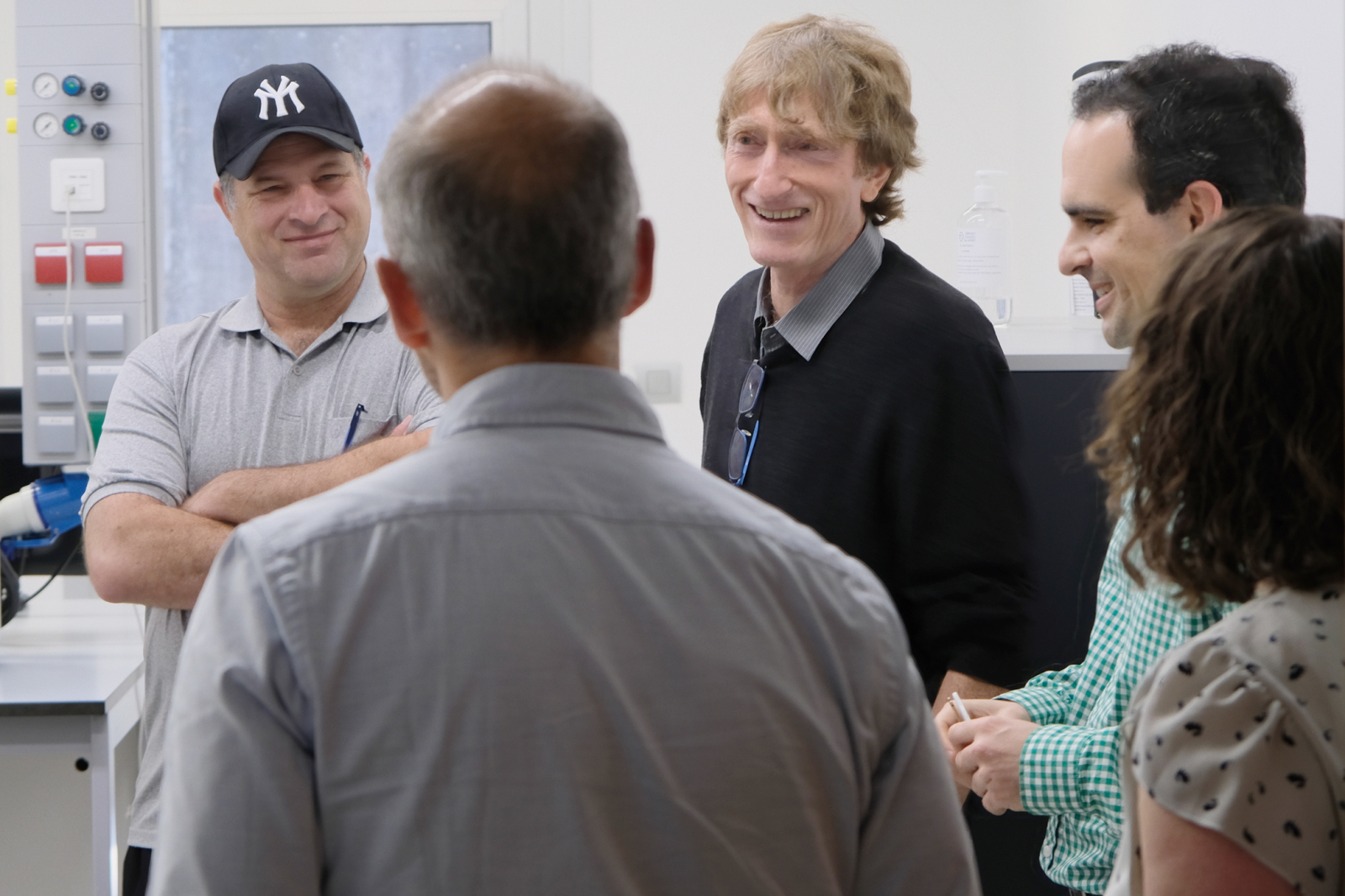Cell and Gene therapy experts from the international consortium ‘CAR T Cells Rewired to Prevent EXhaustion in the Tumour Microenvironment’ (CAR T-REX) gathered on the 28 and 29 May for a General Assembly at CiQUS, Universidade de Santiago de Compostela.
Representatives from Stemmatters (Portugal), TargetGene Biotechnologies (Israel), University of Debrecen (Hungary), and Leibniz Institute for Immunotherapy (Germany) were hosted by partners from the CiQUS at Universidade de Santiago de Compostela (Spain).
Consortium members shared technical innovations and scientific progress updates, with an ambitious vision to improve the efficacy and safety of CAR T-based solid tumour-targeted cell therapies.
- By combining innovative methods of genome editing and non-viral gene delivery, CAR T-REX is exploring the engineering of transcriptional networks in Chimeric Antigen Receptor (CAR) modified T lymphocytes (i.e., CAR T cells), to selectively circumvent T-cell exhaustion upon activation in the tumour microenvironment (TME).
- CAR T-REX aims to (i) build novel auto-regulated genetic circuits controlled by microRNAs (miRNAs) in immune cells, (ii) employ a novel high-performance non-viral gene delivery platform, TraffikGene®[R1] , for introducing the synthetic miRNA-coding constructs, (iii) select and benchmark the best-performing circuit(s) in preclinical settings, and (iv) execute GMP-like manufacturing run(s) for the final CAR T-cell product.
- CAR T-REX consortium brings together a multidisciplinary group of internationally recognised experts and companies across Europe and Israel. The project started in June 2023 and runs for 4 years.
The General Assembly included a visit to the Galaria CAR T-cell manufacturing facilities at Campus Vida in Santiago to explore potential collaborations and discuss the challenges facing the field of cell and gene therapies. Attendees also covered topics related to the innovation potential of the CAR T-REX project, including participation in the European Innovation Council (EIC) Tech to Market Session, covering entrepreneurship and venture building programmes.
Overall, the CAR T-REX consortium expects to lay the foundation of an improved technology, with potential for significant scientific and societal impact. Recent estimates reveal that across 40 European countries there were 4 million new incidences of 25 major cancers (excluding non-melanoma skin cancer) and 1.9 million cancer-related deaths in 2020[1].
Cell and gene therapies (CGT) are at the forefront of healthcare innovation, with the potential to transform the current therapy toolbox. Indeed, highly personalised (autologous) CAR T cell therapies have dramatically changed the treatment landscape, achieving partial or, in a significant number of cases, long-lasting full remission for patients with blood cancers. However, while CAR T cell therapies have shown remarkable efficacy for the treatment of specific haematological malignancies, broad clinical use is limited by multiple factors, including high manufacturing costs and significant side effects. Moreover, treatment of patients with solid tumours has thus far failed to demonstrate clinical benefit, with antigen heterogeneity, limited infiltration into tumour tissue and (especially) T cell exhaustion/loss of function, negatively impacting clinical outcomes. In this regard, CAR T-REX aims to explore a novel paradigm for the generation of improved CAR T cells. By combining non-viral gene delivery with precise genome editing of T cell autoregulatory pathways, CAR T-REX proposes a strategy to overcome the mechanisms by which solid tumours (and the immunosuppressive TME) “switch off” the anti-tumour immune response, potentially extending the utility and safety of current CAR T technologies.
The team at USC (Marisa Juanes and Alberto Fuertes) and CiQUS Principal Investigator Javier Montenegro, who are developing the gene delivery platform TraffikGene®,hosted the meeting in Santiago de Compostela. Marisa Juanes explains: "Welcoming the CAR T-REX consortium to CiQUS was a remarkable experience. The assembly not only highlighted the collaborative spirit among our distinguished members but also set the stage for groundbreaking advancements in CAR T-cell therapies". Alberto Fuertes highlights: "The synergy and commitment displayed by all participants are truly inspiring. We are proud to contribute to this pivotal project that aims to advance cancer treatment."
Rui A. Sousa, CEO of Stemmatters & Coordinator, explains:
“The General Assembly of the CAR T-REX project facilitated important scientific discussions to maximise the impact of the consortium to tackle the treatment of solid tumours. During the next phase of the project, we will be working together to integrate the partners’ technology and expertise into the development of a novel CAR T-cell therapy.”
About CAR T-REX
The consortium comprises three (3) academic and two (2) industrial partners from five (5) European countries. CAR T-REX is led by Stemmatters (Portugal), a regenerative medicine CDMO with expertise in the development and manufacturing of cell therapies under current Good Manufacturing Practice (cGMP). The company will adopt Quality-by-design (QbD) and risk assessment methodologies during product/process development, while leveraging its scientific and regulatory know-how to ensure a faster clinical translation of the CAR T cell therapy into the clinical setting. TargetGene Biotechnologies (Israel) brings expertise in new technologies for gene editing human cells. The company has developed a unique genome editing technology – T-GEE – which displays higher specificity and lower off-target events compared to the gold-standard CRISPR/Cas9, improving the safety of gene delivery systems. The CiQUS at Universidade de Santiago de Compostela (Spain) will employ its versatile delivery technology for non-toxic delivery of relevant cargos to immune cells, a high-value asset for industrial stakeholders working on the development of advanced therapies and nucleic acid-based therapeutics. The University of Debrecen (Hungary) and Leibniz-Institute for Immunotherapy (Germany), provide expertise in immunology, CAR T cell design and development, as well as preclinical models of solid tumours - critical areas in a project focused on the development of a new CAR T technology. This multidisciplinary collaboration brings together a unique set of researchers that encompass all the skills and resources needed to achieve the ambitious objectives of this project.
About EIC
The European Innovation Council (EIC) was created as part of the EU Horizon Europe program. With a €10.1 billion budget, it aims to support game-changing ideas from early-stage research to proof of concept, technology transfer, and the financing and scaling-up of start-ups and SMEs. The EIC Pathfinder Open provides funding for projects in any field of science or technology based on high-risk/high-gain science-towards-technology breakthrough interdisciplinary research.
[1] Dyba T, Randi G, Bray F, et al. The European cancer burden in 2020: Incidence and mortality estimates for 40 countries and 25 major cancers. Eur J Cancer. 2021;157:308-347. doi:10.1016/j.ejca.2021.07.039




